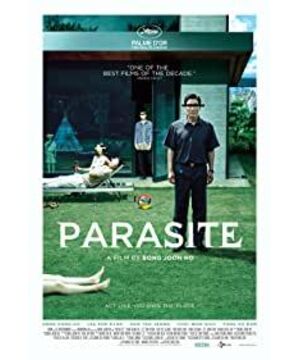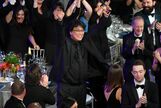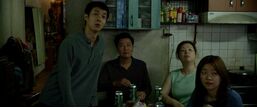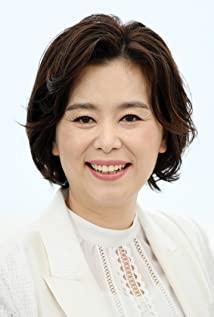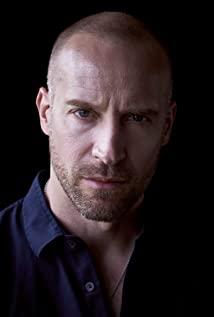décalomanie
The original tentative name of "Parasite" is décalomanie, which is called decal in English, which means "transfer printing method" .
Make an image on paper with ink or something, then fold the paper so the image is printed on the other side .
Director Bong Joon-ho emphasized the concept of "symmetry" .
There is no mother in "Monster of the Han River", "Mother" has only mother and son, in "Okko", parents only appear in the form of a cemetery, only the grandfather and granddaughter are alive, this is the first time he uses "perfect structure" in his own film family form .
The protagonists Kim Ki-taek and President Park 's family are the corresponding traditional four-person family structure of "parents, one son and one daughter" .
When you look at a transfer-printed work, at first glance it will appear that the two sides are the same.
But if you look closely, they are not exactly the same.
Like the two families in my movie that look similar, maybe even identical, but aren't.
About 80% to 90% of the film's story takes place in the houses of the rich and the poor, so it's very detail-oriented.
Multiple opposing structures are set up: rich and poor, up and down, light and dark ...
In Bong Joon-ho's past films, "symmetrical aesthetics" has also been reflected in his control of the picture many times.
stairs mood
Director Feng Junhao was born in sociology and has a keen sense of social issues.
The increasingly antagonism between the rich and the poor and the sharp class conflict in contemporary society have become the nutrients for the creation of "Parasite".
The various staircases in the film are the most blatant metaphors for class differences . Between the Park family's mansion on the top of Seongbuk-dong and the semi-basement of Ki-taek's house far away, the melody composed of steps is used to integrate the whole.
On behalf of the Park family and the Jin family, they maintain a clear top- down relationship .
Up , it represents more available resources . If you want free wifi, you need to reach out to other people's sites.
To want more, you need to get out of the lowlands and climb the steps to the upper realms.
Director Bong Joon-ho is very obsessed with space. During filming, he watched previous movies again and again to find those staircase scenes that he liked.
The stairs appearing in "The Second Girl" directed by Jin Qiyong, "The Fight of Men" directed by Jules Dassin, and "The Servant" directed by Joseph Rossi are all very interesting.
In these works, too, the staircase serves as a passage between the master-servant relationship.
Not only is it a symbol of rich and poor, but it is also the link that carries the tragedy.
Sunlight
The wealthy live in designer mansions with oversized floor-to-ceiling windows, and the lawn in front of the windows is always covered with sunlight.
And poor, poverty not only limits your imagination, but also limits your right to enjoy the sun.
In the semi-underground house of the Keizer family, because the windows are so small and so close to the ground, there is not much sun in a day.
And President Park's house is bathed in sunshine all the time during the day, and the shade is full of greenery.
The lights in President Park's house are all high-end lighting with warm yellow lights.
President Park often walks up the stairs from the garage at night, and the scene is bright and warm.
There were also people in the basement, one by one, turning on the lights for him.
Darkness and light are a common way of showing the gap between rich and poor.
In "Big Buddha Place" directed by Huang Xinyao, the entire film is black and white.
The only two pictures that appear in color, except for the director's ridicule, are when the two use the dash cam to peek into the world of the rich.
parasite
There are no "true parasites" in the whole film from beginning to end .
The only two occasions when worms appear, one is at the beginning of the film, when Kee-taek is sitting at a small table nibbling bread, a stove appears on the table.
Kim Ki-taek reached out and chased away the stove.
In the back, a family sits stacking pizza boxes, and someone sprays insecticide on the street outside the window.
When Kiting said to close the window, Kim Ki-taek said:
Don't close it, just disinfect your home and kill all the bugs by the way.
In the same stratum environment, high-level "parasites" drive away low-level parasites. It foreshadows the battle between the Keizer family and Wenguang and his wife in order to compete for parasitic resources .
In the second place, at the last chaotic party, a fly landed on Wu Qinshi's finger.
He was not the only one who fell to the ground next to him, but the worm would only fly around its "like".
When President Park's family went out to camp, the Ki-taek family pretended to be the masters in this mansion, and began to imagine what would happen if they lived here.
Chung-sook couldn't help teasing Ki-taek, saying that the timid and cowardly Ki-taek was like a cockroach that ran away immediately after turning on the light.
Unexpectedly , as the prophecy came true, the Park family suddenly returned home and panicked their father and siblings who were hiding.
Whether it was Ki-taek who crawled out from under the sofa and was half-frightened by the sudden light on, or the three people who escaped from the mansion and fled in a rainy night.
The ugliness and cowardice of the underlying creatures were immediately exposed.
on that rainy night.
Even though it was a human being, what the audience saw looked like a frightened cockroach that quickly hid back to its nest.
Just like the target of the Ki-taek family's struggle, it was never President Park's family.
But other parasites in the same class and using the same resources as them.
smell
The smell is the most original setting of all the metaphors in this film.
What does the "taste" of the poor mean?
The Kim family's skilled acting skills can't erase the "poor" taste branded on themselves.
They were used to not smelling it themselves, but to the Park family, who were used to the upper class world, it was a strange and unpleasant smell.
President Park gave many examples to explain to his wife the smell of Ki-taek. In the end, he could only describe it as "the smell you can smell when you take the subway", and the wife who rides a self-driving car every day can hardly smell this smell.
This becomes the smell "class segregation" brought about by the "spatial segregation" of the rich and the poor .
It can't be washed or wiped off, it's the "mold" smell brought by the basement.
As long as you don't leave the basement for a day, the smell won't go away.
In order to show this invisible and intangible smell, the film crew spent a lot of time designing the house of the Jin family.
Many people are puzzled, why did Keize put President Park's knife in the end.
It was because President Park couldn't restrain his instinctive disgust and resistance when he flipped Wu Qinshi's body.
The act of covering her nose was exactly the same as Mrs. Park's act of opening the window when she smelled the stinky smell of Ki-taek's clothes after being soaked in the rain.
It was at this moment that Kim Ki-taek, who was in a dream, suddenly woke up.
The rich and the poor that lie between the two families can never be crossed.
simple-minded
It is said that Mrs. Park is too simple, but in fact, the real simple-minded people are still the Keizer family.
Dad had no plans for the future, and such Ah Q's spirit kept him stuck in his comfort zone.
The cleverness of the brothers and sisters eventually pushed themselves into even more unpredictable dangers.
And the Pu family is not really "deceptive" , but the numbness and desensitization that wealth brings to them .
A torrential rain might have a devastating effect on the Ki-taek family, but to the Park family it's as insignificant as a breeze blowing by. There will even be a team to celebrate because of the good weather after the rainstorm.
When the Keeze family rescues the flooded "home", Keating sits in despair and powerlessness on the toilet seat splattered with sewage and smokes.
The Park family stayed warm and happy in the warm and comfortable villa, watching their youngest son Dosong play his own camping game in the courtyard, protected by a strong "Made in America" tent.
Even if the Ki-taek family lives in the Park family, they are only a small part of the life of President Park's family and will not have any impact on their life focus or status.
The Ji Ze family and Wenguang and his wife are both representatives of being eliminated by the torrent of social development .
The Keizers sat unsuspectingly in a pesticide-sprayed room with their children and had no common sense about how wifi coverage worked.
They are the ones who really have simple ideas about society.
Rich people are thinking about how to live in a planned way.
And the poor are thinking about how to live.
Stone
Ki-woo's friend Min Min-hyuk brings him a landscape stone .
This piece of collection , which has a symbol and beauty in the rich man's house , becomes a piece of waste that is not as practical as food when it arrives at Ki-woo's house .
When the torrential rain floods Ki-woo's house, the presence of this stone makes Ki-woo understand. How incompatible he is with the rich, and the distance between the poor and the rich suffocates him.
The stone became a haunting burden and illusory representation in his mind, and a weapon to vent his fears .
In the end, the stone was thrown into the river and turned back into an ordinary stone.
Stones represent parasitic camouflage in different environments.
Do Son's paintings
Dawson's painting is an important prop in the film.
This painting was seen by her mother as a self-portrait of Dawson, but it was not.
The black color block in the lower right corner is naturally not the so-called "schizophrenia" that Keating googled.
Instead, it means that Do Song is the only person in this family who knows the secret of someone in the basement. In the first grade, Duo Song went downstairs in the middle of the night to steal a cake in front of the refrigerator, and accidentally bumped into Wenguang's husband, Wu Qinshi, who was living in the basement and wanted to steal food in the dead of night.
The figures in each of Dawson's paintings are not painted by himself.
It was Wu Qinshi, who opened his eyes wide to peep at the situation in the house.
And that black black block represents the black door leading to the basement .
The one hanging in front of the dining room table is the one with the most hints, and is even marked with an arrow :
Inside this black door, a man once came out.
out of bounds
President Park has mentioned one word many times: cross the border .
What annoyed him wasn't the man doing something out of the ordinary.
Because he is indifferent and indifferent to the subordinates themselves .
He was offended because the other party "crossed the line" and harassed his territory.
And when Ki Woo said he was going to marry Da Hye, the Kim family immediately thought this was the home of their future daughter-in-law.
Mother Zhongshu was a little "floating" immediately after two glasses of wine, and began to express her views on this "prospective daughter-in-law" with a mother-in-law's tone.
In their cognition, having money can naturally change everything .
But in fact, in addition to money, there are circles.
At the last open-air party, Ki-woo stood on the second floor and looked at the glamorous high-class party on the grass in front of him, feeling that he was out of place .
Their family of four worked hard to memorize their lines and practice their acting skills, only to get through and barely get a foothold in the Pu family.
In the real upper class, unexpected invitations can also be faced calmly.
Innate confidence and confidence in the bones, no need to disguise and cover up, it is natural.
When Ji Yu first came to Park's house, there was also such a picture between Wenguang, the housekeeper who received him, and the hostess: the glass line perfectly divided the place where the housekeeper, Ji Ze and Mrs. Park were, and the housekeeper briefly went over to wake each other up. After that, he immediately returned to the other side .
The Jin family and the Park family seem to have achieved "symbiosis" and share a space, but they still occupy a completely different reality .
origin
The more drastic things change, the more they tend to assimilate.
Bong Joon-ho's cruelty is reflected in the fact that his films often stop at restoring the origins of different versions .
In Memories of Murder, he made it impossible for the protagonist to catch the culprit in the end; at the end of the dramatic scene in which Yuko was rescued, there were other super pigs still being sent to the slaughterhouse; and the ending of "Monster" , Xianshu finally died.
At the end of "Parasite" , Ki-taek is willing to be trapped in the basement, while Ki-woo tells his father that he wants to make money to buy a mansion .
As soon as the screen changed, Ki Woo still lived in the semi-basement between.
And the audience is well aware that there is no way Ki-woo can afford the house.
There are several hints of his lack of ability in the film: he failed the university entrance exam four times, he wanted to solve the predicament with a stone, and his lack of innate courage led to backlash.
The odds of Ki-woo trying to leapfrog the class are slim to none.
Even his friend Min Hyuk wanted him to be a tutor because he didn't value Ki Woo's knowledge and friendship. Just because Ki Woo is the candidate who poses the least threat to him, his identity and status are far from matching Da Hui's class .
The director conveyed a harsher reality than "Snowpiercer": the reversal of the class is impossible to achieve .
"Snowpiercer" continues to move forward at least from the end of the train, conveying a message and hope that can shake the class.
And at the end of "Parasite", like a black hole with no hope in sight, everything went back to its original point .
The mansion is still inhabited by the upper class.
Ki-woo in the semi-basement continues to hand out flyers for the pizza shop.
And Ji Ze in the basement took over Wu Qinshi's place, hiding like a dark cockroach and continuing to live.
good and bad
Feng Junhao is good at combining crime with the weak to create disturbing and thrilling suspenseful plots.
But who says the weak must be the good?
The Ji Ze family can be said to be complete fraudsters, relying on lies to parasitize the Park family, but without any malice.
The Pu family is not a capitalist full of oppression and exploitation. Although they are hypocritical and look down on others, they have not done anything so outrageous that the Jin family has reason to kill.
In this movie, all the characters have no clear distinction between good and bad, and there is no opposition or accusation to the poor and the rich.
It's a comedy without clowns, a tragedy without villains.
What is a good person and what is a bad person can no longer be determined based on the results in this modern society.
But even if there are no villains, terrible things can happen.
In society, it is not only the mentally ill, or the bad guys with malicious intent to commit crimes. "She was kind, but she killed people." "He was a good man, but he was deceived."
Most people are actually "grey": appropriately kind and careful, and appropriately bad and mean.
When you try to be normal in the world, only to find that the world may be crazy.
The story isn't over yet .
It is reported that "Parasite" will not only publish related books, but also has been invited by American companies and plans to adapt it into a TV series.
Director Feng said that he hoped to tell some unfinished stories through the TV series.
(First public account: more than fish)
View more about Parasite reviews


